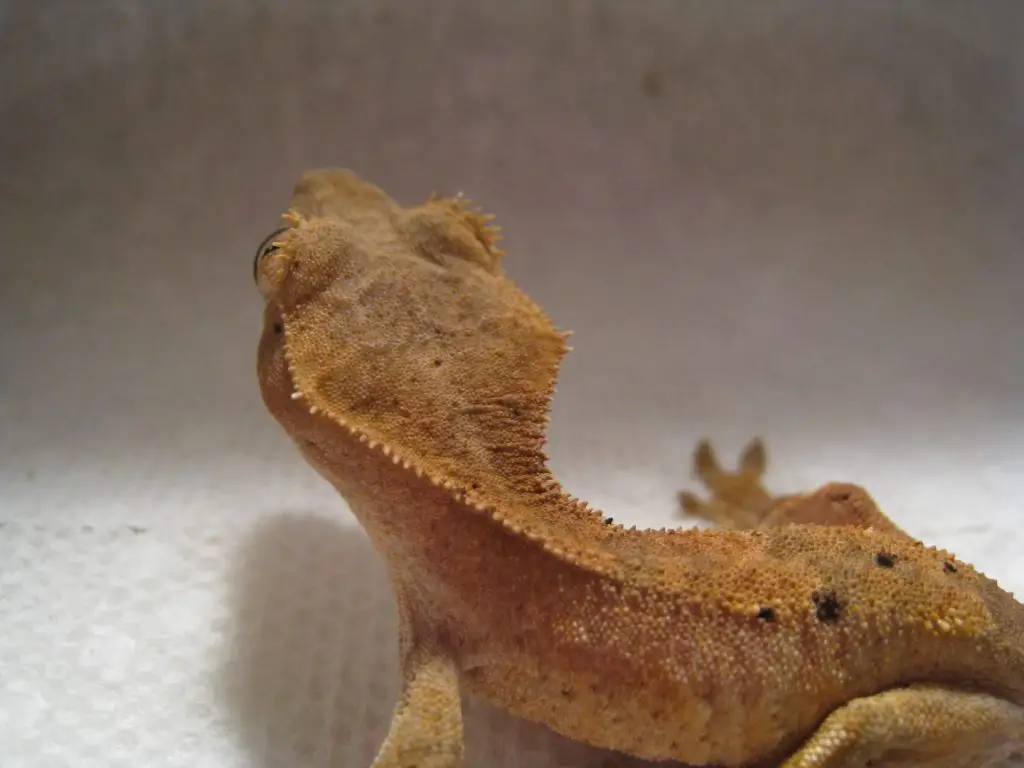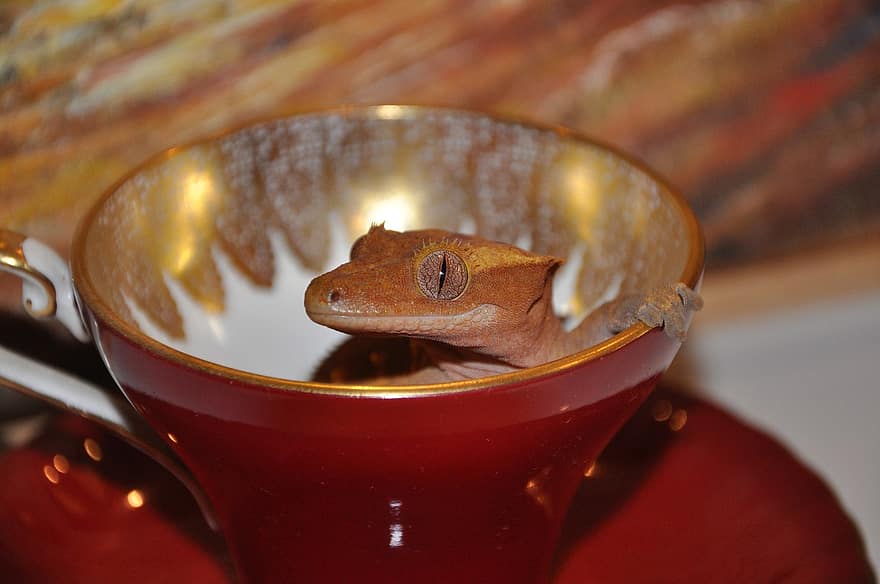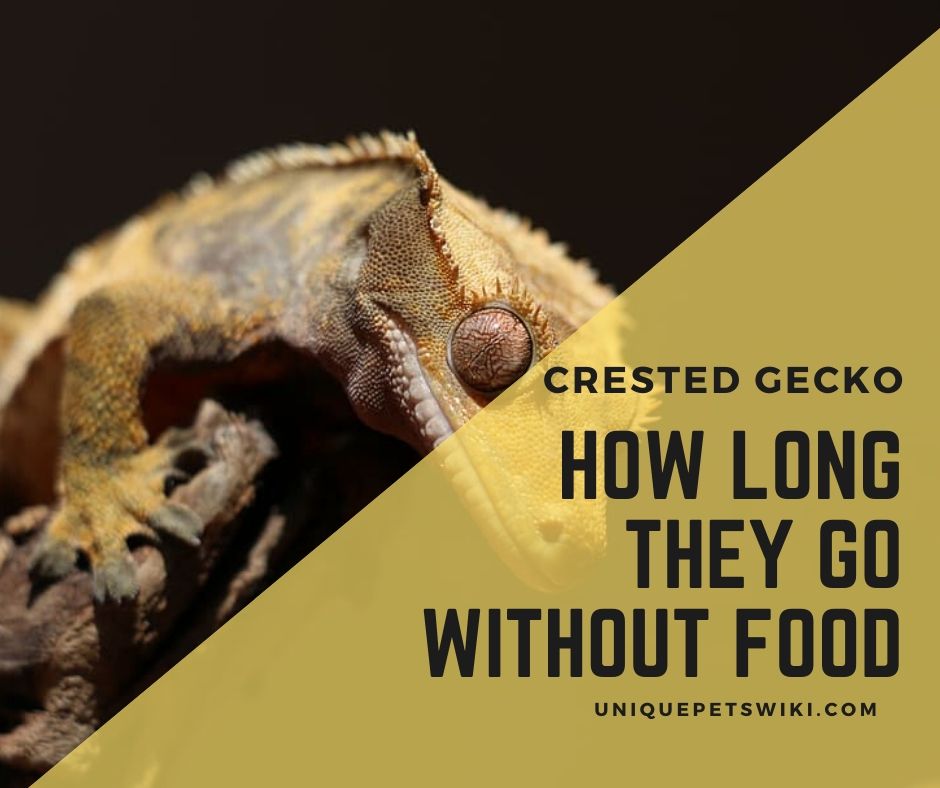Crested geckos are tiny reptiles, and they do not eat a lot. But the question of how long can they live without food is one that can come up regarding these tiny creatures and their eating habits.
You could be a new crested gecko owner preparing to go on a trip and cannot bring your pet with you. You would be concerned with how long they can go for without getting their meals if you are unable to find someone to look after them.
Or maybe they have not eaten in a while and you are not sure how long till they starve to death or if this is just how they are.
These questions and more will be answered in this article so let’s get into it.
This article has been reviewed by Dr. Gospel. Read more about our knowledge control process here.
Contents
How Long Can A Crested Gecko Go Without Food?

how long crested geckos go without food
Although your crested geckos avoid eating for any reason. Before knowing the root cause of crested geckos won’t eat, you need to know how long can a crested gecko go without eating.
In general, an adult crested gecko can go for about two to three weeks without eating. At the two-week mark, you should bring them to the vet to see what is up.
Baby and juvenile crested geckos need to be fed more often than the adult because they eat much more than the adult stage.
Baby Crested Gecko
When they are babies (newly born to about seven months old) they will eat a lot. This is because they are still growing. They should be fed about five times a week.
They can eat small crickets and meal worms. The size of theses should be the width between their eyes. Therefore, they should be able to go without food for about a few days. This can be the case if the enclosure is new to them.
Juvenile Crested Gecko
Juvenile (seven months up to 18 months) crested gecko eat a bit less. They can be fed three to four times a week. However, they could also go for several days to maybe a week without food.
Adult Crested Gecko
As mentioned, adults can go for two to three weeks without their meals. They reach adulthood (18 months and up) and they eat even less cutting their meal times to two to three times a week.
However, they should weigh about 30 to 55 grams when they are adults, and if it is lower there could be a cause for concern. It is important to weight your crested gecko weekly and keep track of their weight. It can differ for about 0.1 grams.
Why Isn’t A Crested Gecko Eating?
There can be a few factors that may contribute to your pet gecko not eating their meals. Some of these factors you can solve while others would require a vet to take a look at the crested gecko. We shall go through the main ones.
A New Environment
Geckos need time to get used to their new surroundings. This can be a new enclosure or even their new roommates. They are not stress-eaters and, therefore, their meals will go to waste since they are not eating.
However, they should start eating properly at about a month of being in their new home. If not there may be a more serious problem and should be taken to the vet for a catch-up.
You can also help them become more comfortable in their new space by adding branches and leaves to make it more like their natural environment. Plus, this can give them places to hide if they want to.
When your crested gecko first moves in it is not a good idea to force-feed them. Instead, leave some food in their bowel so that they can eat when they are ready. Give them time to grow to love their new home.
Roommates And Enclosure Size
Regarding their roommates, you should not keep different sized crested geckos together. You can keep a maximum of three adult geckos (not males) together but make sure that the enclosure is big enough (about 30 gallons or more can work).
For one crested gecko, you would be looking at a 20-gallon enclosure. This can help create a good gradient as well as give them space to hide and play. The reason why you should not keep more than three adults together is due to stress.
It would be best to keep different ages separately.
Stress is one of the causes of losing appetite. That is why you would want to keep different ages separately and this includes hatchings and juveniles. They can bully each other leading to weight loss due to lack of eating.
Wrong Temperature
Crested geckos cannot eat a lot in the winter months and this is normal. Therefore, if the temperature of their enclosure were to drop to below 70 Fahrenheit (about 21. 1 degree Celsius) they will not eat.
The opposite is also true in that if it is too hot then they will get stressed.
The ideal temperature for them should be a gradient of between about 71 to 79 Fahrenheit (about 21.6 to 26.1 degrees Celsius).
This could be achieved by having one side at about 68 to 70 Fahrenheit (20 to 21.1 degrees Celsius). While the opposite end is about 75 Fahrenheit (about 23.9 degrees Celsius). This can also help them to move around.
New to crested gecko? Check out the crested gecko care sheet now! We had listed out all the things you need to know about crested gecko as pets. Check it now!
Impacted Crested Geckos
Your gecko may not be eating because they are full and have not yet passed their waste. This could be because they have eaten the loose substrate (the flooring of the enclosure) or you feed them large insects with hard shells.
The substrate should not be loose because the baby/ juvenile can ingest it. The food that you feed your crested gecko should be the size of the space between their eyes, not bigger. You should monitor their droppings and how often the “go”.
You should replace the substrate with paper towels to help monitor the drops and do not feed them any bugs until they are back to normal. Their normal is them relieving themselves about three to four times a week.
While they are impacted (the food is trapped in their intestines, hence they cannot eat) you can feed them food that is more liquid-like as well as high in fiber. Pumpkins and unshaven apples can be a good choice.
To tell if they are impacted their stomachs will be bigger and rounder. Plus, they gained a few grams quickly before they stopped eating, and they are obviously constipated.
Sickness
The factors above are ones that you can help with. However, if your crested gecko is sick then you would need to take them to the vet. They can suffer from internal parasites, respiratory infections, Metabolic Bone Disease, or any other types of infections.
Some Other Factors
- They have aged, adults eat a lot less than juvenile
- They are dehydrated or the humidity is not right. Their enclosure should be at about 70 to 85 percent
- It is time for them to hibernate
- It is breeding season
- They are shedding
How to Force Feed a Crested Gecko

If you are getting desperate and you have spoken to your vet, you can force-feed your crested gecko. Take your gecko and gently, with your thumb push down on their front. This is mostly done to keep them in place.
Then take a small syringe and gently push it against their lips until they open. Once, they are open you should empty what is in the syringe. You can use a mash of the food that they like and make it more liquid-like as to easily go out of the syringe.
However, the best meal would be CGD (crested gecko diet) which is designed to be balanced and healthy for the gecko. It is a powder that is filled with all the vitamins and minerals they need.
CGD is mixed with water until it has the texture of yogurt but if you are force-feeding then ore watery would be better.
In Conclusion
Crested geckos do not eat that much. If you have a new one give them some time to get used to their new home. But keep an eye on their weight and if you notice anything out of the ordinary the best thing to do would be to take them to the vet.
